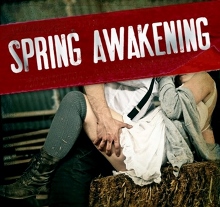AWAKENING TO THE FACT THAT IT’S A POORLY WRITTEN MUSICAL
I feel sorry for the cast and crew of Over the Moon Productions (OTM). The hard-working Broadway-caliber talent in Spring Awakening on the Egyptian Arena Stage is phenomenal, (especially the standout of the night Payson Lewis in a minor role); the technical design is superior to that of any given Los Angeles 99-seat theater; the seven-piece band is flawless; Kate Sullivan’s direction – although liberally borrowed from the Broadway and touring productions – uses the cramped space to thrilling perfection; and the beautiful, young thespians are indelibly illuminated by Brandon Baruch.
Never have I seen patrons – who already have tickets – line up one hour prior to show time; the excited buzz of the teen and 20-something patrons in the lobby prior to curtain was palpably electric; some were even attending the Duncan Sheik/Steven Sater musical for the third time, joining the packed, overflow crowd on 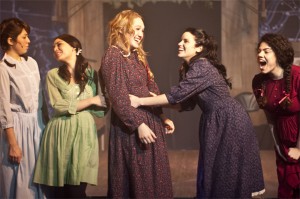 Easter day, when most theaters would gladly have given away tickets. All of this following OTM’s hit production of Rent.
Easter day, when most theaters would gladly have given away tickets. All of this following OTM’s hit production of Rent.
Wait, didn’t I just say I feel sorry for them? Yes, I feel sorry that the talented youth of our theater community have little better to produce for themselves – with roles that suit their age – than this overblown tripe, another Golden Calf of the American Theater. With high-spirits and lovely performances to spare, OTM highlights the long-standing injustice and awkwardness of the teen’s plight (sex, abortion, molestation, bullying), but they have a perplexing show on their hands.
Spring Awakening hit a universal chord among young audiences: they love its coffee-house, soul-searching melodies, and, as with Rent, they are liberated by seeing their youthful angst represented on stage: adult characters are unfair, harsh, and they don’t understand teens; the kids in the musical, for the most part, are horny, curious, smart, vulnerable, lost, confused, poetic, openly gay and, in one case, suicidal. The adults, played by two actors, are abusive teachers, obtuse parents, and disengaged clergy. I wonder how I would have felt seeing this show at 17, and hearing two of the best songs of the night, “The Bitch of the Living” and “Totally 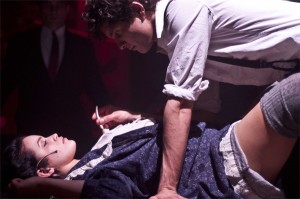 Fucked.” I’m getting a woody just thinking about it. The adult that is me, however, only notices The Bitch of the Modern American Musical and how numbed audiences have little idea how Totally Fucked we are because of it.
Fucked.” I’m getting a woody just thinking about it. The adult that is me, however, only notices The Bitch of the Modern American Musical and how numbed audiences have little idea how Totally Fucked we are because of it.
There were only five people older than the twenty-somethings in the crowded theater: the two I spoke with admitted that the show isn’t so great yet they are returning customers. Why? The energy, the passion, and the sheer joy of the young performers in such a professional production for only twenty-five bucks.
These tender thespians, if they are going to work and/or showcase themselves, don’t have much else to turn to besides Spring Awakening. Since the Golden Age of Broadway, any musical theater artist will tell you that they cut their teeth on roles which called for much older actors. There was a time when actors had no choice but to play Aunt Eller and Nathan Detroit in school. What happens when they enter the “real world?” No employment. Hence, super-talented kids are mostly relegated to the chorus, awaiting maturity and the hopes of more opportunities to play the lead. Let’s face it, there are only so many roles for youngsters in the Broadway Musical landscape: Laurey Williams, Pippin, and J. Pierrepont Finch, to name a few. Even fewer are the musicals that require large young casts, such as West Side Story and Hair.
Also notice the hypocrisy in age-specific casting: when the, shall we say, mature Bernadette Peters is shockingly lauded as the lead in Annie Get Your Gun, what do you suppose would happen if Daniel Radcliffe was cast as Honoré Lachaille in Gigi 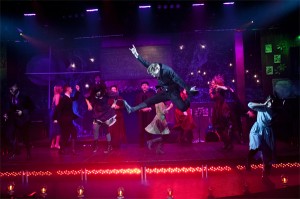 or Henry Higgins in My Fair Lady? (I might eat my words later on the latter.)
or Henry Higgins in My Fair Lady? (I might eat my words later on the latter.)
But something changed for the young musical theater artist in 1996 when Jonathan Larson brought musical theater to the MTV generation with Rent. Now, not only were there more roles for fresh talent, but the subject matter spoke directly to people of the same age as the characters they watched. Rent is far-superior to Spring Awakening, with much better songs, but as transcendent as the subject matter may be, it is an imperfect, unfinished musical whose meteoric rise can be attributed to two things: first, it spoke to the outrage of a newly disaffected generation, who took inspiration from its modern love stories and rage-against-the-machine mentality; second, on the day of Rent’s final dress rehearsal before its Off Broadway premiere, creator Jonathan Larson died.
Still, it spawned a new era for musicals; sadly, we haven’t seen many great musicals hit the boards since then. On top of that, roles for young actors are still few, even as audiences crave youth on stage. Since 1996, there have been a few well-deserved, if imperfect, hits (The Producers), and the overlooked masterpiece (Caroline, or Change), but somehow, we turned the corner to over-touted jukebox musicals (Rock of Ages), silly musicals adapted from silly movies (Legally Blonde, Xanadu, 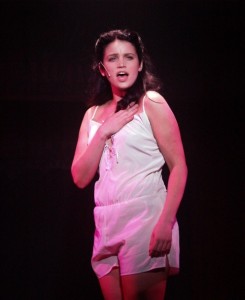 The Addams Family) and, worst of all, trifling musicals that hit at the right place at the right time with no competition, namely Spring Awakening. What bothers me is the ensuing and undeserving attention paid to its creator.
The Addams Family) and, worst of all, trifling musicals that hit at the right place at the right time with no competition, namely Spring Awakening. What bothers me is the ensuing and undeserving attention paid to its creator.
Steven Sater, librettist and lyricist of Spring Awakening, is an over-hyped hack who, out of sheer timing and luck, won a Tony Award in 2007 for his poorly-constructed, issue-packed book about adolescent angst and sexual coming-of-age. At least Sater included some choice dialogue from his source material (the far-superior 1892 German play by Frank Wedekind), but he also picked up another Tony for his prosaic, pseudo-poetic, convoluted lyrics, packed with schizophrenic rhyming. The biggest problem is that most of the numbers, while thematically universal, are not character-defining. Fortunately for Sater, the music by Duncan Sheik, while occasionally overblown and inaccessible, is haunting, raw, driving, and brilliantly orchestrated.
I have now seen three Sater shows – one of which, admittedly, was a non-musical tryout and not open to critical reviews – but based on his book and lyrics for both Spring Awakening and the atrocious Some Lovers at the Old Globe, I wonder if this obviously intelligent man can even write for the theater. Sadly, a Tony Award is the Willie Wonka Golden Ticket of the theater; more and more, producers take on projects based on the prestige of a writer’s name and his awards, not the actual project before them. This means we will not be seeing the last of Sater any time soon.
Hopefully, Sater will prove me wrong in the upcoming The Nightingale, which opens at La Jolla Playhouse in July. This musical, with music also by Sheik and direction by Moises Kaufman, has been workshopped since 2003. Will the brilliant Kaufman be able to help Sater differentiate between pop, bad poetry-coffeehouse lyrics, and those necessary to tell a story properly? Or will mediocrity prevail? [Update, 2013: The Nightingale was, as suspected, awful.]
Obviously, audiences no longer care – they’ll go to whatever high-energy, splashy, loud musical they are told to attend. While OTM is to be more than commended for turning a sow’s ear into a sow’s purse, they deserve better material. So do all of us.
photos by Kat Hess
Spring Awakening
Over the Moon Productions
Egyptian Arena Stage in Hollywood
scheduled to end on April 22, 2012
for tickets, call 310-903-6150 or visit Over the Moon
